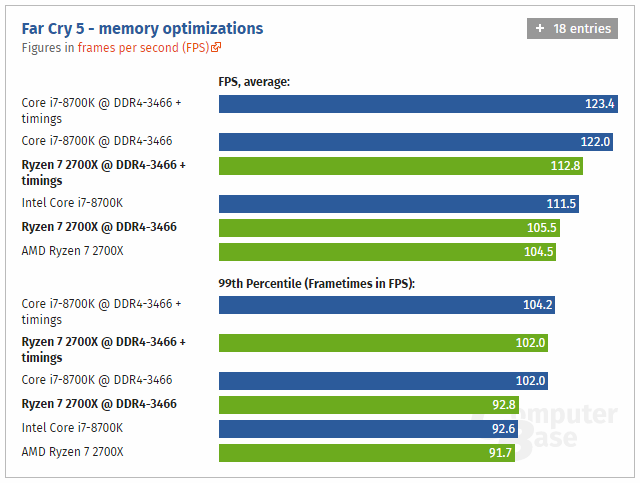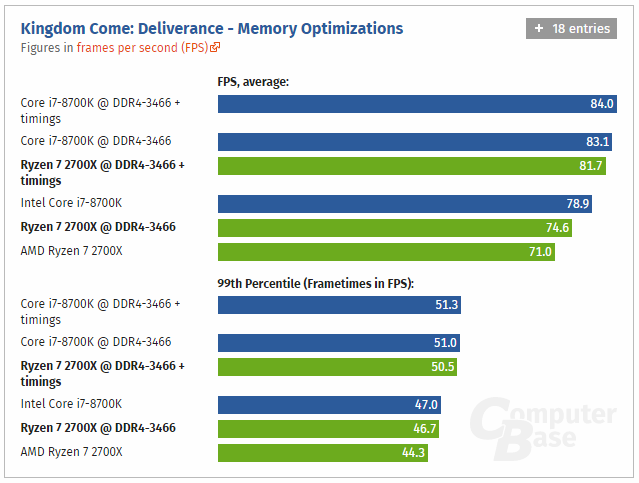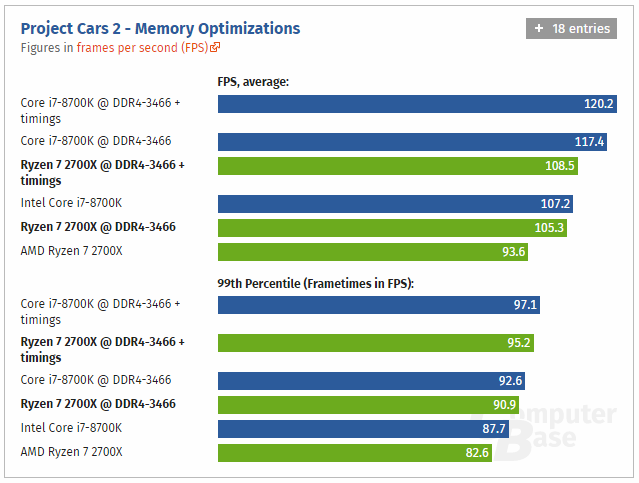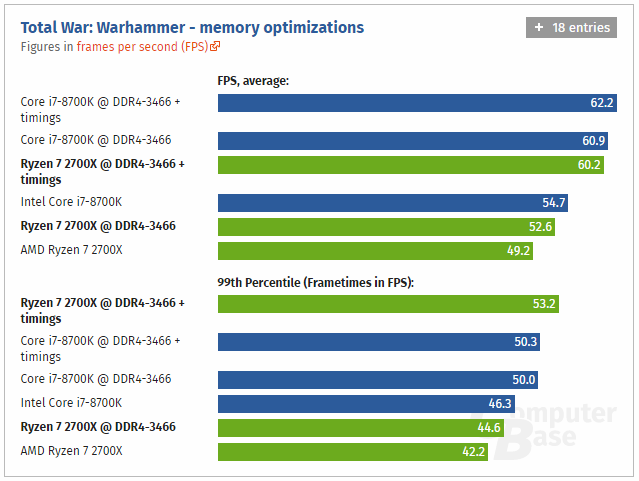Ryzen 7 2700X Memory Optimization benchmarks vs Core i7-8700K
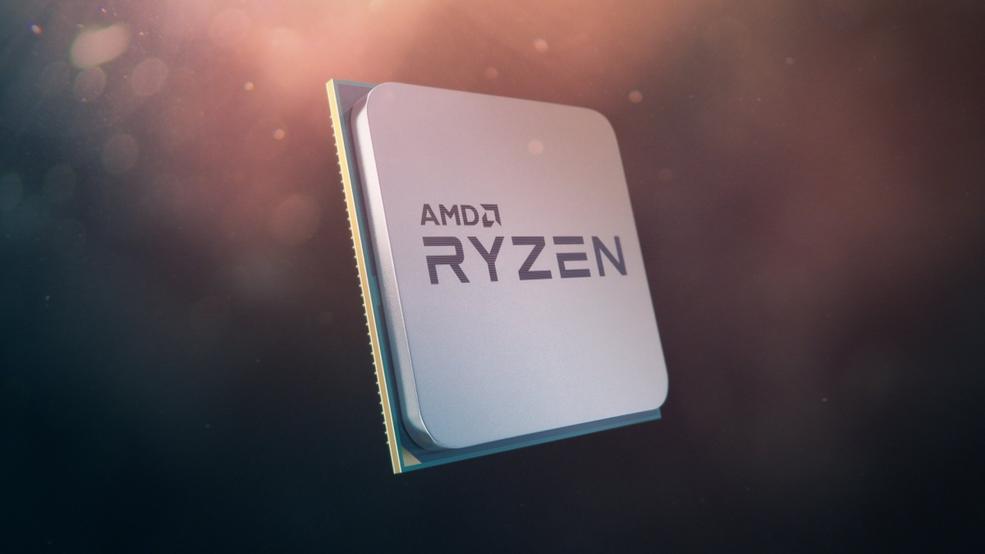
We’ve seen that the gaming performance of the first generation Ryzen processors could be partly improved by higher memory speeds and aggressive secondary timings. Well, this is still the case with the newest Ryzen 2000 series, which already supports DDR4-2933 MHz memory (native) instead of 2666 MHz. In this post, we take a look at how Ryzen 7 2700X memory impacts its gaming performance compared to the rival Intel Core i7-8700K.
AMD Ryzen 7 2700X Memory Speed and Timing Effect on Gaming Performance
Folks over at ComputerBase.de tested the top Ryzen 7 2700X on an Asus ROG Crosshair VII X470 motherboard. The test system included a G.SKILL TridentZ Series (2 x 8GB) DDR4 4133 memory kit (with Samsung B-Die, Single Rank). The memory is configured to DDR4-3600 at 16-16-16-1T primary timings and all other timings using the automatic function. This required a DRAM voltage of 1.4V.
At 1.36V, they had DDR4-3466 which still ran flawlessly, with standard timings. For a second series of tests, the storage profile of the well-known Finnish overclocker “The Stilt” stored in the BIOS of the motherboard was used for the Samsung B-Dies, which reduces the primary timings to 15-15-15-35 and optimizes almost all secondary timings.
Ryzen 7 benefits greatly from Memory Optimization
The higher memory clock of DDR4-3466 results in memory latencies on Ryzen 7 2700X reduced from 72.2ns to 64.5ns, compared to DDR4-2933. At the same time, the storage throughput increases significantly. With the optimized sub-timings, the latency drops to 60.7ns while the throughput continues to increase.
The latency is pretty close to those of the Intel CPUs. For reference, the Core i7-7700K and i7-8700K have latencies of 55.9ns and 54.3ns, respectively.
Now, by combining the two measures – the memory clock and timing, let’s take a look at the gaming performance of the CPUs. The games run at 1080p max settings on an Nvidia GeForce GTX 1080 Ti.
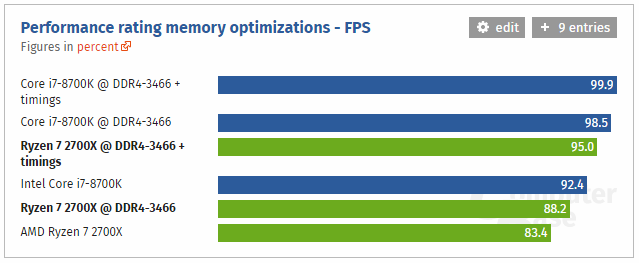
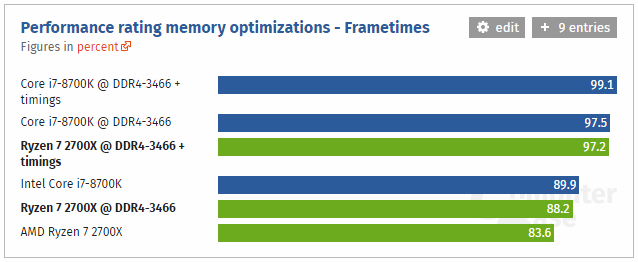
Using a higher memory clock, the Ryzen 7 2700X sees a 6% improvement in frame rates, which reaches up to 14% when we include the optimized timings as well. The 2700X runs faster in games than the Core i7-8700K, but only if the latter operates at default settings.
Similarly, the frametimes also improve by 6% via DDR4-3466, and with better timings, it is even 16%. In both cases, the more aggressive timings offer more gaming muscle than the higher RAM speed.
Not a big gain for Intel CPUs; Games respond differently
Of course, an Intel system also benefits from better memory optimization. The DDR4-3466 helps reduce the memory latency on the Core i7-8700K from 54.3ns to 45ns, while the storage throughput increases significantly. In response to the faster memory, the 8700K posts a gain of 9% in average FPS which is 3% better than the AMD flagship processor.
However, the optimized sub-timings add only 2% to the performance. This narrows the gap between the i7-8700K and Ryzen 7 2700X from 11% to 5%.
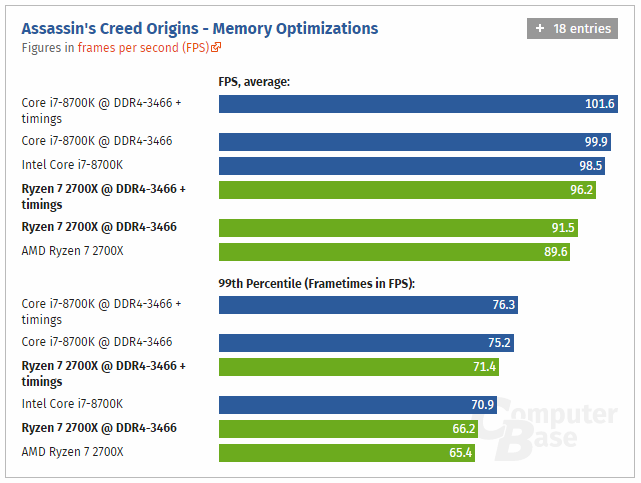
That said, games respond very differently to the memory clock and timings. For example, Assassin’s Creed Origins running on 2700X only gains 2% boost due to the higher clock rate, but a total of 7% through both measures. Far Cry 5 also shows a similar behaviour.
In case of Project Cars 2 though, DDR4-3466 brings in 13% faster FPS whereas the better timings only account for 3% more. Total War Warhammer runs 6% faster on the higher memory clock; include the timings and it reaches a whopping 22%, which is even 9% faster than the i7-8700K but at default settings.
